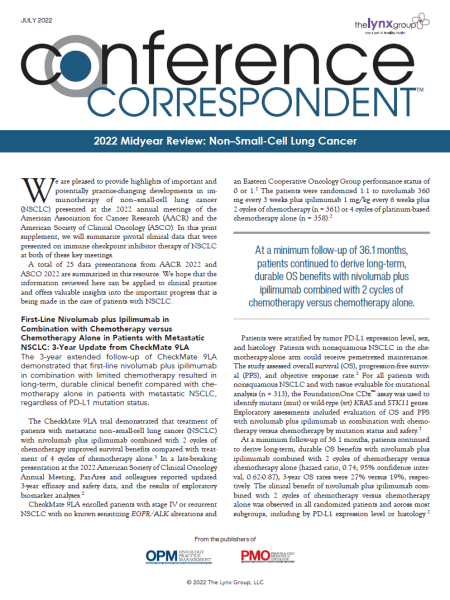Savolitinib had promising antitumor activity in patients with METex14+ NSCLC and showed acceptable tolerability.
Patients with non–small-cell lung cancer (NSCLC) and MET exon 14 skipping mutations (METex14+) have unmet medical needs. Pulmonary sarcomatoid carcinoma (PSC), a rare type of NSCLC, has a poor prognosis and a high incidence of METex14+. The oral MET tyrosine kinase inhibitor savolitinib has been shown to have antitumor activity in combination with osimertinib in patients with NSCLC and EGFR and MET-amplified mutations.
This multicenter, multicohort, single-arm phase 2 study evaluated savolitinib treatment in patients with unresectable or metastatic METex14+ PSC and other NSCLC for safety, efficacy, and pharmacokinetics. A central laboratory confirmed MET mutations. A once-daily dose of savolitinib (600 mg for weight ≥50 kg or 400 mg for weight <50 kg) was administered until disease progression or intolerable toxicity. Evaluation of the tumor was performed every 6 weeks in the first year, and subsequently every 12 weeks. An independent review committee (IRC) evaluated the objective response rate (ORR) as a primary end point. This study reports the results of a cohort of patients who had no previous MET treatments.
From a pool of 593 patients, 87 were identified with the METex14+ mutation, of which 70 were treated with savolitinib. The demographics of the cohort included a median age of 68.7 years (range, 51.7-85.0 years), 58.6% male, 92.9% had stage IV cancer, 60% had previous treatments, 57.1% had adenocarcinoma, 35.7% had PSC, and 7.2% had other pathologic types.
The IRC evaluated 61 patients based on those who had ≥1 lesions at baseline and had ≥1 postbaseline evaluations or postbaseline radiologic disease progression. The evaluated cohort had an ORR of 47.5% (95% confidence interval [CI], 34.6%-60.7%) and a disease control rate of 93.4% (95% CI, 84.1%-98.2%); the median duration of response had not been reached. The median progression-free survival among all savolitinib-treated patients was 6.8 months (95% CI, 4.2-13.8). Peripheral edema, nausea, increased aspartate aminotransferase/alanine aminotransferase, vomiting, and hypoalbuminemia were the most common treatment-related adverse events (TRAEs). The incidence of grade ≥3 TRAEs was 41.4%, and the incidence of TRAEs leading to discontinuation of treatment was 14.3%. The most common TRAEs leading to discontinuation of treatment were liver injury and hypersensitivity (both at 2.9% incidence).
Reference
Lu S, et al. J Clin Oncol. 2020;38(suppl 15):Abstract 9519.

